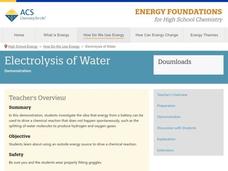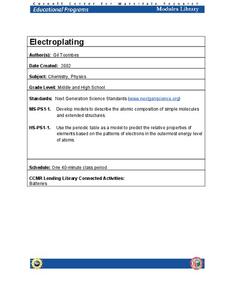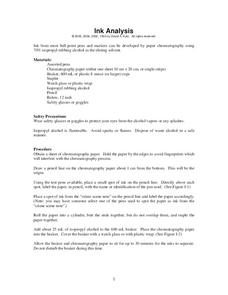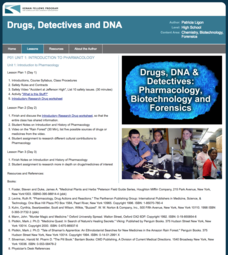Personal Genetics Education Project
DNA, Crime and Law Enforcement
Civil rights meets biotechnology in a instructional activity that scrutinizes the collection of DNA of citizens who have been arrested, but not yet convicted of a crime. Real-life cases are examined in which the DNA of a relative was...
American Chemical Society
Electrolysis of Water
Young scientists know that water is H2O, but can they prove it? Through a simple electrolysis of water demonstration, scholars see the two gases produced as a result of a chemical reaction. Because this reaction doesn't happen...
What affects Frog metamorphosis?
In this lab, students explore pollutants which affect frog metamorphosis using household pollutants (vinegar, oil, and bleach) and sponge capsules.
Cornell University
Chemical Reactions
Investigate the Law of Conservation of Mass through a lab exploration. Individuals combine materials to initiate chemical reactions. They monitor for signs of reactions and measure the masses before and after the reactions for...
Curated OER
Emergency? Ask A Kid!
What is an actual emergency situation and what should you do to prepare for it? Learners will identify a variety of emergency situations and the appropriate way to address first aid concerns to minimize injuries. They will also discover...
Curated OER
Alka-Seltzer Cannons
The scientific method is emphasized in this engaging and exciting chemistry lesson. Learners get to create Alka-Seltzer cannons out of film cannisters, water, and Alka-Seltzer tablets. Carbon dioxide gas builds up inside the cannister,...
Curated OER
Cents-ible Chemistry-Analysis of the Metal in a Penny
Students determine the base metals and surface metals in a penny. In this analysis of metals lesson plan, students determine the density of five pennies minted in different years. They use different chemicals such as hydrochloric acid,...
Nuffield Foundation
How Good is Your Toilet Paper?
You'll never forget the importance of toilet paper and hand washing ever again. Scholars perform an experiment to model the transfer of microbes in the bathroom. They perform three trials to test the transmission of yeast using their...
Curated OER
Magic Color
First graders discover that a chemical reaction is responsible for the effects seen with Crayola Color Wonder markers. They observe that the color changes are the result of a chemical reaction between chemicals in the Color Wonder paper...
Cornell University
Electroplating
Silver pennies and copper nickels are made possible by applying some chemistry. Learners use electrolysis to coat a penny with zinc sulfate and a nickel with copper sulfate. Their investigation builds an understanding of electroplating...
School Improvement in Maryland
Executive Order
After reading information about Executive Order #9066, class members assume the voice of an 18 year-old Japanese-American born in California and placed in an internment camp. Individuals then craft a letter to President Roosevelt...
Curated OER
Independence and Conservation
Learners read an original story "Brothers of the Rainforest" downloaded from the internet site provided. Students investigate the impact of the demise of a particular species on the rest of the environment. Learners participate in a...
Curated OER
Ratios And Scale
students investigate the concept of using a ratio in the work of construction and solve problems using real life applications. They read descriptions of how various types of construction professionals use ratios on the job. The lesson...
Curated OER
Appalachia
Students investigate the benefits of dance and participate in dances. In this dance activity, students investigate a number of dances such as square dancing and clogging that are native to Appalachia. They use math concepts to determine...
Nuffield Foundation
Measuring the Vitamin C Content of Foods and Fruit Juices
Are you getting enough vitamin C? Young scientists determine the amount of vitamin C in fruit juice samples. They accomplish this task by adding DCPIP solution to the samples until the blue color of the DCPIP persists. Once this happens,...
Curated OER
2003 U.S. National Chemistry Olympiad Part III
In this chemistry Olympiad worksheet, pupils are given 2 lab problems to work on. They must explain their experiment they would carry out, show their data and write their results and conclusions of the lab and the process.
University of Georgia
Antacid and Uncle Heartburn
Household materials can be used for more than cleaning! In this collaborative experiment, emerging chemists use products such as vinegar and liquid antacid to explore chemical reactions that commonly occur in the human body.
Chymist
Ink Analysis: An Experiment in Paper Chromatography
Test differences in writing instruments with this hands-on activity to demonstrate paper chromatography in action. The class performs an experiment on multiple writing instruments and determines the area of separation to discover an...
Curated OER
Ink Analysis
High school chemistry class members become "detectives for a day" and use the concept of paper chromatography to analyze a note left at the scene of a crime. Pupils test the ink on the note with a solvent, such as isopropyl alcohol, to...
Cornell University
Predicting Chemical Reactions
Prove the Law of Conservation of Mass through a lab investigation. A well-designed lesson asks groups to combine materials and monitor indicators for chemical reactions. Measuring the mass of the reactants and products allows individuals...
Kenan Fellows
Unit 1: Introduction to Pharmacology
Learn about the study of medications, including those found in nature and those made synthetically. The first of four lessons in a series on pharmacology includes lectures, hands-on experiments, research, and more.
NOAA
Microfriends
Is there medicine found in the organisms that live deep below the surface of the ocean? The fifth lesson in a six-part series has learners team up to research bacteria and the relationship it has with nearly every living thing on Earth....
Nuffield Foundation
Assessing Skin Sensitivity—Touch Discrimination
How do we distinguish between the number of things touching our skin? Scholars explore an interesting lesson through an experiment. They learn that there must be an unstimulated sensory unit between two touches to distinguish them. They...
Curated OER
Chemical Changes Making Foam and Using Indicators
Students are able to observe chemcial and physical changes while producing a brilliant formation of foam. They are able to experience the use of an indicator in the reaction. Students record information based on their observations.
Other popular searches
- Kitchen Safety Procedures
- Food Safety Procedures
- Science Safety Procedures
- Lab Safety Rules Procedures
- Osha Safety Procedures
- Lab Safety Procedures
- Proper Lab Safety Procedures
- Storm Safety Procedures























